The Enemy Within in the War of 86
by ZeroReq011,I got into 86 some weeks after its first episode, about when both anime-only viewers and light novel readers were on the same page of this war story: it's great. Interested, I asked around Twitter about how 86 handled its war subject. I can like shows about war, but I'm not a fan of super edgy ones. One of my good Twitter buddies replied that 86 treats its war subject quite sensitively, and that its author is fairly knowledgeable about history and anti-war literature, even including a reference to Erich Maria Remarque's All Quiet on the Western Front in the original work. Intrigued, I typed back to my buddy that "he" seemed interesting, only to be corrected that Asato Asato is actually a "she." It was an honest mistake, and I've since taken care not to make those assumptions lightly. While I don't consciously think women can't write good stories about war, society also has this larger stereotype of war stories being a male pursuit. 86 is a great story about war, one that was written by a woman. This experience, though, reminded me that as a member of society, I'm not immune to making bad prejudgments.
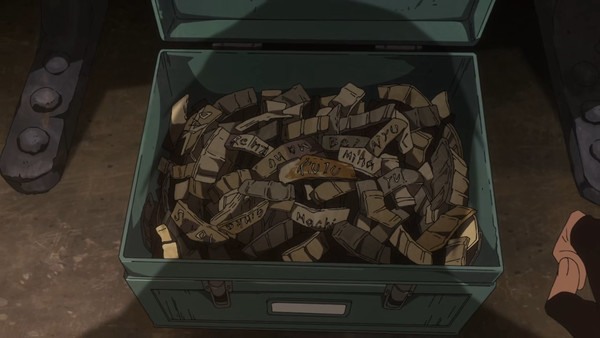
And neither are the characters of 86. They make prejudgments, carry prejudices, and discriminate. Much as it would be a gross disservice to war literature to dismiss contributions from female writers like 86's Asato Asato, the discrimination rife in the Republic of Magnolia does a gross disservice to the country's war against the Empire of Giad. This internal discrimination is losing the Republic the war, and the protagonists of 86 have to find a way to address it before it's too late. But first, one of 86's protagonists, named Lena, is confronted about a bad prejudgement.
Lena Lives in a Society
Now hold up. Prejudgment, prejudice, discrimination... how are these loaded terms relevant to the anime exactly? Racism is a core part of the story of 86, one that makes the story nonsensical if ignored; as such, these terms are the layers through which 86 examines racism, so let's define them quickly. From a sociological standpoint, prejudgments are attitudes, good or bad, that erroneously characterize other groups based on incomplete information. Prejudices are prejudgments, erroneous and negative, that characterize other groups and are difficult to reverse even with complete information. Discrimination are prejudicially motivated actions that detrimentally target other groups. In 86's Republic society, the majority Alba is prejudiced and discriminatory towards the minority 86.

It's 86's Alba majority society that Lena is born and raised in, though she's grown critical of it despite being an Alba herself. Vladilena "Lena" Mirizéna is a young Alba woman and newly promoted major in the Republic's military, the youngest to reach the rank. She's hardworking both on her own merits and relative to her Alba peers, who drink and slack off during work hours, and throw fits and scapegoat when they do poor work. Lena's rapid climb up the military is also conveniently helped by her pedigree and connections. She's from a prominent family, her deceased father and her father's friend both ranking military officers. Lena and her peers work as Handlers, commanding fighting outfits composed of 86er Processors. 86 is the official label for the Republic's minorities, derived from the 86th of the 86 districts making up Republic territory. The majority Alba Handlers command these 86er soldiers remotely behind the safety of walls – many treating their duties lightly, and 86er lives casually.

The prejudicial attitudes of the Alba Handlers toward their 86er soldiers and the discriminatory label of "86" by the Alba majority government are the results of a successful propaganda campaign waged across classrooms and airwaves. To the prejudicially conditioned Alba, the Republic's minority peoples have never been human; rather, they've always been swine that don't deserve real names. Alba Handlers command 86ers remotely for the same reasons 86ers are crowded in the 86th ghetto and out of sight of most other Alba: to restrict opportunities for Alba to encounter and empathize with 86ers. With propaganda being their primary source of 86er information, Alba Handlers can push on callous actions and pyrrhic victories that cost 86ers dearly without second thoughts, as they're inhuman swine anyway. Alba civilians can accept news of zero war casualties without a second thought despite 86er evidence to the contrary, as no one who mattered died. This discriminatory institution of sacrificing 86er lives and sparing Alba ones is promoted as an enlightened way to wage war.
Lena Calls Society Out
I have a couple more sociological concepts to introduce now that are important to the discussion of the anime, so bear with me. Institutions are the established organizations and practices of a society. When individual acts of discrimination are accepted and encouraged by government and cultural norms such that they're constantly reproduced on a societal scale and through successive generations, discriminatory acts become institutionalized. Institutional discrimination in 86 colors relationships between Alba and 86ers so encompassingly that even Alba without especially strong feelings against 86ers will casually discriminate or tolerate discrimination against them without much harder thought. Discrimination is such an ingrained feature of society in 86 that not even a progressive Lena can fully escape being influenced by it.

Lena finds this discriminatory institution that sacrifices 86er lives for Alba ones to be far from enlightened, and being yet unable to emancipate all 86ers herself, she tries to challenge the ingrained prejudices animating this institutional discrimination. She takes her military work seriously, being relatively studied in tactical positioning and readily forward about providing support to her 86ers with information she has privileged access to. She resists her mother's admonitions to find a marriage partner and retire from dealing with 86ers and the military, and dismisses her friend's suggestions to take up less stressful work in the military that doesn't involve fighting and interacting with 86ers. Lena stages impassioned defenses of 86ers and boldly slams the public policy on them in front of other Alba, albeit fully expecting she'll be safe from harsh reprimand due to her status and her uncle (her father's friend) protecting her. She tries to talk regularly and cordially with her 86ers; they ask why, and her answer is couched in idealistic, platitudinal rhetoric: they're human like her, and therefore deserve her talking to them.

It comes as a huge shock to Lena that the 86ers under her command don't all love her. In the background scenes of the Spearhead squadron she volunteers to handle after her military promotion, and even from the insincere tone of her soldiers' farewell when she departs from her prior command, it's clear that many of the 86er Processors mock and resent her. Even among those in Spearhead willing to talk extensively with her, many later admit they do so mostly to humor her and kill time, not really taking her attempts at bonding seriously. At the end of the day, she's an Alba and they're 86ers. Lena may be nicer to them than prior Handlers, but as her inferiors in military rank and social status, they're forced to listen to her regardless of whether they want to. She boasts about how she's human like them, but she doesn't contribute equally to the battlefield like the 86ers, who are far more experienced and knowledgeable about fighting their common foe. She doesn't risk her life on the battlefield like them, who point out she can retire from fighting whenever she wants to enjoy sweets and stress-free safety.
Lena Gets Called Out

The Spearhead loses its first member labeled Kirschblüte under Lena; in her attempt to express regret for the loss, one Spearhead labeled Laughing Fox snaps. What gives her the right, he demands, to mourn any of them dying when it's her and her people, the Alba, who facilitate their deaths? How is she any different from hypocrites shielded by their privileges and connections, feigning concern to stroke their egos while staking nothing in return? Who is she to be sad about Kirschblüte like the rest of them when she doesn't even know her real name? When she never bothered asking any of their names – asking a cat, a literal animal, what it goes by before it occurred to her that her fellow human beings have names behind the labels?
In some ways, Lena made an honest mistake. All 86ers have aliases they go by while fighting in the field, a common practice that militaries employ to prevent sensitive information leaks to the enemy. No 86er she's worked with until now had disclosed their real names or asked to be called by them. Missing the nuance between names and labels is a mistake that probably a lot of people would make, and not just Lena (you can read more about names in this That Time I Got Reincarnated as a Slime article). To be fair, she does actually believe in her ideals and really does want to befriend Spearhead. She doesn't have many friends among her Alba peers because of her work ethic and idealism. Her sheltered upbringing and self-inflicted alienation makes her knowledge of both adult life and the outside world far from complete.
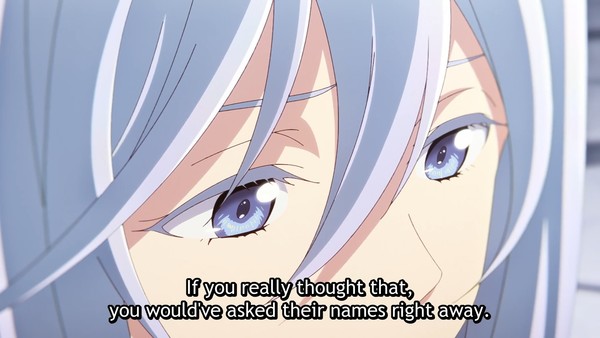
Apart from these factors though is the insidious conditioning effect institutional discrimination has on a society's denizens, on those who aren't aggressively discriminatory like many Alba Handlers and even those who consider themselves stridently anti-discriminatory like Lena. Such a seemingly small detail as forgetting to ask individual 86ers their names is not just something Lena unfortunately overlooked; it's a by-product of the institutional discrimination that remade and governs society, one where the public narrative of the 86er minority has been revised so completely that it doesn't naturally occur anymore to most majority Alba to wonder what they were named before they were relabeled a number.
Lena's own affecting experience of being saved by an 86er long ago – plus her deceased father's deeply anti-discriminatory beliefs – peeled away the blindfolds enough for her to gaze at society critically, but that critical perspective does not automatically spare her from being influenced by her society subconsciously in ways she's not fully aware of: like a handed-down label standing in for an extant name. It's not entirely surprising that even someone as progressive as Lena would mistakenly conflate the names of Spearhead's 86ers with their Alba labels, just as it's not too difficult to understand why the 86ers would see little point in offering their real names to other Alba like Lena. She's an Alba who is their Handler, and they're 86ers who are her inferiors, as far as society's concerned. She's from the extremely wealthy parts of the Republic, and they're 86ers from their poor Republic ghetto: they just wouldn't be thinking the same things because their circumstances are just too different.
Lena, Kaie, Theoto, Shinei, and Spearhead

86ers would think Alba aren't interested in learning their names and might become irritated by the implication that they possess something humans like them would, but Lena's interested, despite her prejudgements. Lena has these prejudgments because of the trickle-down influence of her society. However, they're not prejudices, and she's deeply critical of her society to begin with. The more understanding members of Spearhead let Lena know what information she's missing, and she resolves never to talk down to them again and learn each of their names. Kirschblüte is named Kaie Taniya, Laughing Fox is Theoto Rikka. Undertaker, the leader, is Shinei Nouzen. Then there's Aiden Shuga, Daiya Irma, Anju Emma, Kurena Kukumila, Lecca Rin...
Though it's absurd to believe Lena is personally responsible for all Alba that mistreat 86ers, many in Spearhead have prejudgments against Alba strong enough to solidify into prejudices, and a few discriminate against Lena, who only means well. Theoto sketches a caricature of her as a fat pig with a dress that some in Spearhead laugh at, and Kurena relishes the thought of breaking Lena mentally like Spearhead's prior Handlers. The members of Spearhead treating Lena this way may ultimately be out of line, but they as 86ers have far more sympathetic cause for it than the Alba. After all, the former are fighting, dying, and suffering due to the attitudes, policies, and convenience of the latter. Lena can appreciate the gulf, so she introduces herself properly with her own name (they never asked it either) before personally asking each Spearhead theirs, all despite being informed of them earlier by Shinei.
The Enemy Without

Lena takes their criticisms seriously, so she also resolves to stay in touch with everyone even during battles, leading to a grim revelation: she can't go beyond the walls to fight with her soldiers, despite Theoto and others' scoldings. Instead, she does the next best thing with the Para-RAID, providing supportive information where she can and witnessing their last moments if it comes to it. The Para-RAID is a neural-link device that allows the Handlers and Processors to share not only verbal communications, but mental states. These devices are part of the reason that Spearhead Handlers prior to Lena suffered mental health declines that led them to later quit Spearhead or even commit suicide in some cases. In battle, the intense mental stress Processors endure transfers over and can overwhelm Handlers who aren't prepared for it; that – and the voices of the dead.
Shinei suffered a near-death experience that left him with the "ability" to listen to the "thoughts" of those piloting enemy units from the Empire of Giad, labeled Legion. "Those" is a mischaracterization, because unlike the Republic of Magnolia, no one is personally piloting Legion machines. "Ability" is an oversimplification, because it's not something that Shinei can turn off at will. "Thoughts" is a misnomer, since they're not thoughts in the way human ones work. When Legion machines take out a human Processor with their heads intact, they repurpose whatever's left of their brains to serve as ghost commanders for their armies – the more intact the brain, the better the commander. This sci-fi take on zombification, also referencing a case of Biblical demonic possession, makes the hordes of Legion network-directed by these ghosts very dangerous, as it bestows upon masses of clunky automated drones the advantage of human tactical ingenuity and adaptability.
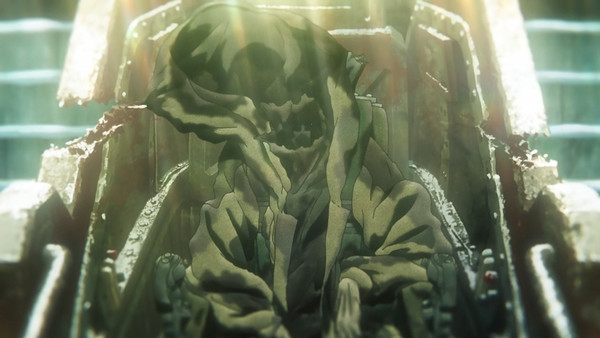
These ghost commanders also tend to repeat through communicators the final words of Processors before they were murdered and repurposed. Shinei assures Lena that like most zombies, their comrades' deceased and turned minds are definitely gone and the enemy is just mindlessly repeating their last lines. For the unaware and unprepared, such a "tactic" could destroy morale among 86er Processors in addition to mentally wrecking Alba Handlers. Lena quickly understands – to her horror – what an increasingly intelligent and numerous Legion horde could do to a Republic that has allowed its military readiness to rot away while also throwing away its best-trained fighters. The Republic's Alba leadership estimated that all active enemy machines would fall apart within the span of two years. It did not anticipate these machines to make more of themselves, much less incorporate the minds of fallen belligerents to extend their lifespans.
The Enemy Within
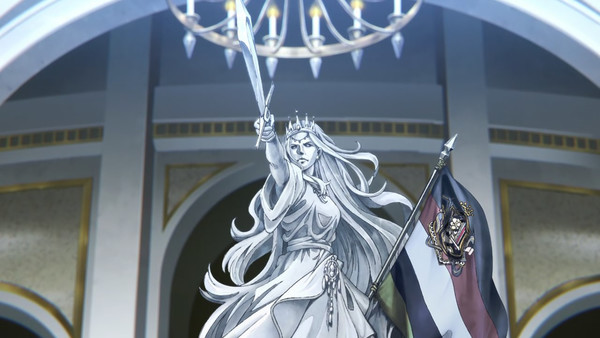
Numerous Legion machines are amassing with intelligent ghost commanders at their head, readying a decisive strike to breach and swarm past the Republic's walls. In contrast, what's left of the 86er fighting units after years of forced fighting are teenagers. They are battle-hardened and skilled, but far too few in number to fend off this inevitable offensive themselves, much less stage any counterattacks. The Alba leadership is extremely reticient about risking Alba soldiers in the war effort, and many in the Alba mid-tier officer corps are inexperienced and incompetent.
Spearhead had known these facts for a while now, but were unable to pass this information up through their prior Handlers. The Spearheads are 86ers, after all. Lena's predecessors were prejudiced and discriminatory Alba that wouldn't take them seriously; perhaps the thought occurred among the Spearheads to let this big secret die with them as a final revenge against the Alba. After discovering it was his brother that saved her though, 86er Shinei at least is willing to give Lena, an Alba, a shot at saving the country, passing the information along directly to her.
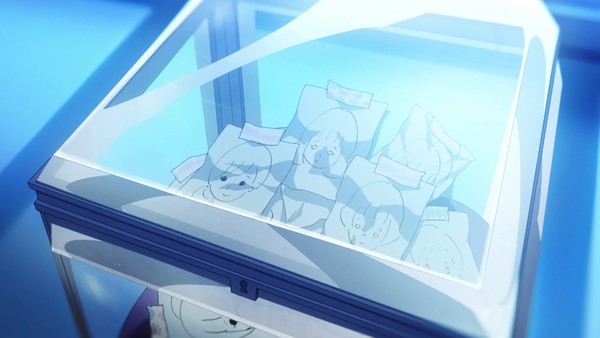
Institutional discrimination was losing the Republic the war. But now that Lena knows, perhaps she and her comrades can change society up enough before it's too late.
Social Scientist & History Buff. Dabbles in Creative Writing & Anime Criticism. Consider following him at @ZeroReq011
discuss this in the forum (5 posts) |
this article has been modified since it was originally posted; see change history